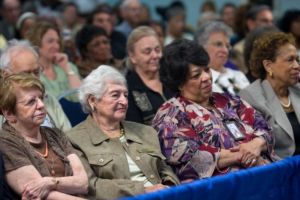
On Dec. 18, the Communication Workers of America filed a class action lawsuit against T-Mobile US, Amazon.com, Inc., Cox Communications and Media Group, and hundreds of other large employers and employment agencies for age discrimination. These employers excluded people age 38-years old and over (in some cases 40 or 45 and over) from seeing ads for career opportunities advertised through platforms on Facebook. Facebook’s paid ad platform can be used to hide job opportunities from older workers nationally.
The complaint alleges that this practice violates federal, state and locals laws barring age discrimination.
“Today, the primary way workers find out about job openings is online, including by getting job ads on Facebook. It’s not right if people my age are deliberately screened out, and I don’t even get the chance to hear about jobs that I know I have the skills to do,” said one of the plaintiffs, a former call center worker.
One in five workers is over the age of 55; 68 percent of older workers believe that they have experienced age discrimination. The onset of this discrimination starts when workers are in their 50s. This case, however, shows that the capitalists are lowering the age bar to discriminate against workers in their late 30s.
Age discrimination can be hard to prove unless it’s overt. It’s couched in careful metaphors just like discrimination based on race or disability. One older job seeker told Forbes magazine in the 2014 article “The Ugly Truth About Age Discrimination,” that his recruiter was told by the hiring manager that after seeing his LinkedIn profile it was decided not to interview him, saying he was a bit “long-toothed” for the position.
When I was elected Secretary Treasurer of my union local in AFSCME, the first order of business was to win back the job of our president. He was getting older and he began getting back pain. He asked for reasonable accommodations — asking for a lighter load since he was working long hours, facing the physical stresses of being a Child Protective Services worker — and they found a reason to fire him.
Government workers often work in the same job for 10, 20 even 30 years. It’s a remnant of how the private sector used to be for workers. This has changed because the ruling class doesn’t want to maintain a layer of aging workers. We are looking at systemic age discrimination, especially in the private sector.
Building solidarity with younger workers
The CWA lawsuit speaks to the issues of all workers. Whether hidden or not, the image used to recruit for fast-paced and stressful work environments, like those listed in the class action suit, is of a strong under 35-year-old worker, smiling despite the assembly-line like pace. Who hasn’t witnessed a stressed cable company worker trying to resolve a problem in your home — with messages coming in saying to hurry to get to the next customer? Instead of arguing that young people are better suited to such stressful jobs, a different approach would be to struggle to hire more workers and slow down the pace.
We need to point out the discrimination against those who are NOT targeted by these Facebook ads, and we need to point out who they ARE targeting. The bosses want young and less experienced workers who they can push harder and who are more likely to fall for the bosses’ false promises. We must stand in solidarity with young workers who are being forced to take on a pace at work that is so exploitative that the assumption is that only those in their prime can handle the work. I recently told a friend that we need to make some kind of plan for him because working for low wages at a physically demanding job means that he is on the road to becoming disabled.
More real evidence is piling up to challenge companies. The Villareal lawsuit in 2010 showed two significant changes for job seekers, the first being that online formats predominate and exclude applicants based on age. In this case against R.J Reynolds, 20,000 older applicants were excluded from being considered. The other trend is that protections have narrowed for age discrimination in general due to practices of audience targeting, and later, computer elimination of categories of applicants based on age.
Racist discrimination not dead yet either
In 2016, ProPublica led an investigation that found Facebook’s platform allowed the exclusion of African Americans, Latinos and Asian Americans from receiving ads for various economic opportunities, including housing and employment ads.
There’s other cases too. In 2015, Deneed Montgomery Smith filed suit against the Louisiana Department of Health and other government agencies after she was demoted for filing an EEOC complaint based on racism and age discrimination.
In the quest for profit, the capitalists are turning to an old bag of tricks. No better example is the election of Donald Trump who has opened up the Pandora’s box of racism, sexism, bigotry and other forms of discrimination, signaling that it is time to continue to build the counter offensive.





